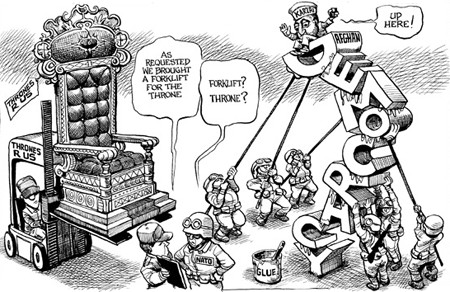The head of the U.N. mission in Afghanistan acknowledged Sunday that there was "widespread fraud" in the August presidential election but refused to give specifics or lay blame to avoid influencing the ongoing recount.

Cartoon from The Economist
Kai Eide appeared before reporters to respond to allegations by his former deputy, Peter Galbraith, that the Norwegian diplomat had sought to cover up evidence of massive fraud allegedly committed on behalf of President Hamid Karzai during the Aug. 20 balloting.
Galbraith, the top-ranking American in the U.N. mission, was fired Sept. 30 by U.N. Secretary-General Ban Ki-moon after the widely publicized dispute over how to deal with the fraud charges, which threaten to discredit both the Afghan government and the international strategy for combating the Taliban insurgency.
During a news conference, Eide said he could "only say that there was widespread fraud" and that "any specific figure at this time would be pure speculation" until the recount is complete. Eide said Galbraith's allegations against him "have affected the entire election process."
Eide was flanked by ambassadors from the United States, Britain and France in a silent show of international support for the U.N. mission and its embattled leader.
Last week, Galbraith said he was sticking by his allegations. He accused the United Nations of failing to exercise its responsibility to oversee the Afghan elections, adding that "the flaw that took place in Afghanistan was preventable."
Eide addressed Galbraith's allegations in detail for the first time Sunday. He said he decided to try to open a number of polling stations that Galbraith wanted closed because of security concerns. The American said keeping them open risked fraud.
But Eide argued that shuttering them would deny a large number of people the opportunity to vote and create "an important element of potential instability in the country." Many stations in insecure areas in the south returned results that have been deemed suspect.
Eide also addressed a charge that he tried to cover up fraud by telling U.N. staffers not to pass on information they had about ballot-stuffing or low-to-nonexistent turnout in some areas. Eide said that the U.N. gave election officials and fraud investigators all the information that they deemed credible, but did hold back information that came from phone calls from second- or thirdhand sources, many of whom changed their accounts repeatedly.
Eide said both he and the U.N. mission have suffered from the accusations, and that the charges have also "heightened the temperature" of discussions about elections, making it harder to convince people that the process will be fair.
The Obama administration and its international allies had hoped that the election would produce a legitimate partner to help reverse the gains made by the Taliban, which have exploited public discontent over corruption and lack of services.
Instead, the election has widened the gap within the coalition of Afghan groups that oppose the Taliban.
Preliminary results released last month showed Karzai winning the election without about 54 percent of the vote. But a recount, expected to be completed this month, would force a runoff with second-place finished Abdullah Abdullah if Karzai's totals fall below 50 percent.
Once the election results become clear, President Barack Obama is expected to complete a review of Afghan strategy and decide whether to accept a recommendation by his top commander here, Gen. Stanley McChrystal, for up to 40,000 more troops.
Among the options under review is a plan to maintain U.S. troop numbers at their current levels and shift the focus to missile strikes and special operations against al-Qaida leaders, including those sheltering in neighboring Pakistan.
In the latest fighting, U.S. and Afghan forces stormed a mountainside compound in eastern Afghanistan before dawn Sunday and killed more than a dozen militants in a compound used by an al-Qaida figure, according to the U.S. military.
The fighting in eastern Kunar province started overnight when the troops pushed into targeted compound in the hopes of capturing those inside, said U.S. military spokeswoman Capt. Elizabeth Mathias. They quickly came under fire, sparking a clash in which more than 12 insurgents died, she said.
There were no casualties among the allied troops or civilians, Mathias added.
Provincial government spokesman Gen. Khalilullah Zaiyi said 18 insurgents were killed in the fighting in Mano Gai district, in the Pech valley.
Some militants were detained, Mathias said. She did not have information on whether any al-Qaida operatives were among those captured or killed, nor did she give the name of the terrorist commander believed to have used the compound.
Also Sunday, four Afghan soldiers were killed when their vehicle struck a bomb in Paktia province, police said.
Meanwhile, the Japanese foreign minister made a surprise visit to Kabul on Sunday, making him the first Cabinet-level official of Japan's new government to visit Afghanistan.
Katsuya Okada was meeting with President Hamid Karzai and other officials during the one-day trip to discuss the strengthening of Japanese efforts to help stabilize the country, said Fumio Shimizu, Japan's deputy ambassador in Afghanistan.
Japan has committed to paying all Afghan police salaries for six months and is funding a number of infrastructure, agriculture and education projects.
But Prime Minister Yukio Hatoyama has said his government plans to discontinue Tokyo's refueling mission in the Indian Ocean in support of U.S.-led forces in Afghanistan by January.
"Sending troops is not necessarily the only way you can provide support," Okada said.
Okada is scheduled to head to Pakistan when he leaves Kabul.



